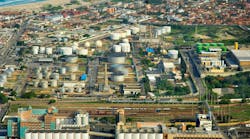Energy BioSystems Corp., The Woodlands, Tex., on Thursday presented findings validating its approach to improving the enzyme that is the prime reaction determinant in a bacterial strain critical for removing sulfur from petroleum products. The firm has found the gene responsible for the desired properties of the strain of bacteria it uses in the diesel biodesulfurization process it is working to commercialize.
Philip Pienkos of Energy BioSystems presented these findings in the biodesulfurization field at the 100th General Meeting of the American Society of Microbiology in Los Angeles.
Biodesulfurization (BDS) is a revolutionary biocatalytic approach to removing sulfur from petroleum streams. It has many advantages over hydrodesulfurization, the industry standard, says Energy BioSystems. Commercializing BDS, however, will require increases in the rate and extent of reaction in order to meet regulatory and economic goals. Improvements will come from a biocatalyst with enhanced kinetic properties and expanded substrate range.
BDS has long been of interest to refiners as an alternative means of removing sulfur from refined products�particularly diesel. It has been tested at the pilot-plant stage for several years, and the first commercial unit is expected to start up at Petro Star Inc.'s Valdez, Alas., refinery next year (OGJ, Feb. 22, 1999, p. ). But scale-up of the process has been a problem.
Research progress
In the presentation, Pienkos discussed his firm's programs in "directed evolution" of the BDS biocatalyst, which involved isolating a bacterial strain capable of growth with biodesulfurized diesel being the sole sulfur source. Using its proprietary gene-shuffling technology known as RACHITT (Random Chimeragenesis on Transient Template), Energy BioSystems has determined that a variant dszC gene in this strain is responsible for the desired properties of this strain of bacteria.
A combination of growth selections and high-throughput screening have identified chimera that have improved properties of both the rate and the extent of the biocatalytic reaction to remove sulfur from diesel, says the firm.
"We've been working for several years to commercialize this biocatalyst, and now we've identified dszC as the prime determinant for both rate and extent of reaction," says Peter
Policastro, president and CEO of Energy BioSystems.
Worldwide concern over the burning of high-sulfur fuels has led to increasingly stringent regulations regarding the level of sulfur acceptable in petroleum streams such as gasoline and diesel. On May 17, the Clinton administration proposed new rules to eliminate 90% of the pollutants from the diesel smokestacks of heavy trucks and passenger buses beginning in 2006 (OGJ Online, May 17, 2000). These regulations would require petroleum refiners to cut 97% of the amount of sulfur now found in their diesel fuels.

